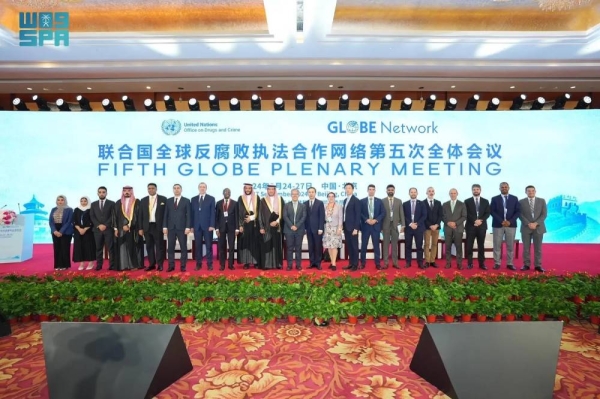Dr. Nasser Abaalkhail, the undersecretary for international collaboration at the Saudi Oversight and Anti-Corruption Authority (Nazaha), has recently been elected as the president of the Global Operational Network of Anti-Corruption Law Enforcement Agencies (GlobE Network) for the term of 2025-2027. His unanimous election reflects the directive of the Saudi leadership to establish the country as a global leader in various fields, including anti-corruption efforts. This victory showcases the international community’s trust in Saudi Arabia’s commitment to combating transnational corruption crimes and reducing safe havens for corrupt individuals and their assets. The election took place at a high-level meeting of the GlobE Network held in Beijing, as announced by the United Nations Office on Drugs and Crime (UNODC).
The GlobE Network was initially launched by Saudi Arabia during the G20 Summit ministerial meeting in 2020 and was officially adopted by the United Nations on December 17, 2021, during the ninth session of the Conference of the States Parties to the United Nations Convention against Corruption, held in Egypt. This initiative has gained recognition and praise from various international bodies, including UN Secretary General António Guterres. In his speech at the opening of the first UN General Assembly special session against corruption in 2021, Guterres commended the Kingdom’s role in creating the network.
As part of the network’s structure, Spain has been appointed as the chair of the Steering Committee, with Saudi Arabia taking on the role of vice chair. The GlobE Network has seen significant growth and success over the past three years, with 219 anti-corruption agencies and international organizations, as well as over 120 countries, joining the initiative. This widespread participation demonstrates the network’s effectiveness in addressing evolving patterns of corruption and the concealment of proceeds derived from corrupt activities.
One of the key objectives of the GlobE Network is to enhance the effectiveness of anti-corruption efforts globally by fostering collaboration and coordination among law enforcement agencies and international organizations. By working together, these entities aim to develop the necessary tools and strategies to combat corruption and hold corrupt individuals accountable for their actions. The network also seeks to create a unified front against transnational corruption crimes and to establish mechanisms for the recovery and repatriation of illicit assets acquired through corrupt practices.
In his new role as president of the GlobE Network, Dr. Nasser Abaalkhail will play a crucial role in driving the network’s agenda forward and ensuring its continued success in the fight against corruption. His experience and expertise in the field of anti-corruption efforts make him well-suited to lead the network in achieving its goals and objectives. Under his leadership, the GlobE Network is expected to strengthen its partnerships, expand its reach, and implement innovative strategies to combat corruption on a global scale.
Overall, the election of Dr. Nasser Abaalkhail as the president of the GlobE Network marks a significant milestone in Saudi Arabia’s anti-corruption efforts and its broader role in the international community. With a strong commitment to combating corruption and promoting transparency, Saudi Arabia is poised to make a valuable contribution to the global fight against corruption through its leadership of the GlobE Network. As the network continues to grow and evolve, it is well-positioned to make a tangible impact in reducing corruption and ensuring accountability among individuals and institutions worldwide.










